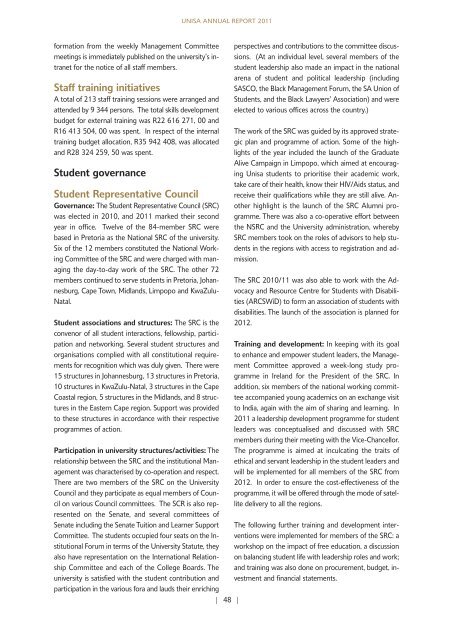Download the Annual report 2011 - Unisa
Download the Annual report 2011 - Unisa
Download the Annual report 2011 - Unisa
You also want an ePaper? Increase the reach of your titles
YUMPU automatically turns print PDFs into web optimized ePapers that Google loves.
formation from <strong>the</strong> weekly Management Committee<br />
meetings is immediately published on <strong>the</strong> university’s intranet<br />
for <strong>the</strong> notice of all staff members.<br />
Staff training initiatives<br />
A total of 213 staff training sessions were arranged and<br />
attended by 9 344 persons. The total skills development<br />
budget for external training was R22 616 271, 00 and<br />
R16 413 504, 00 was spent. In respect of <strong>the</strong> internal<br />
training budget allocation, R35 942 408, was allocated<br />
and R28 324 259, 50 was spent.<br />
Student governance<br />
Student Representative Council<br />
Governance: The Student Representative Council (SRC)<br />
was elected in 2010, and <strong>2011</strong> marked <strong>the</strong>ir second<br />
year in office. Twelve of <strong>the</strong> 84-member SRC were<br />
based in Pretoria as <strong>the</strong> National SRC of <strong>the</strong> university.<br />
Six of <strong>the</strong> 12 members constituted <strong>the</strong> National Working<br />
Committee of <strong>the</strong> SRC and were charged with managing<br />
<strong>the</strong> day-to-day work of <strong>the</strong> SRC. The o<strong>the</strong>r 72<br />
members continued to serve students in Pretoria, Johannesburg,<br />
Cape Town, Midlands, Limpopo and KwaZulu-<br />
Natal.<br />
Student associations and structures: The SRC is <strong>the</strong><br />
convenor of all student interactions, fellowship, participation<br />
and networking. Several student structures and<br />
organisations complied with all constitutional requirements<br />
for recognition which was duly given. There were<br />
15 structures in Johannesburg, 13 structures in Pretoria,<br />
10 structures in KwaZulu-Natal, 3 structures in <strong>the</strong> Cape<br />
Coastal region, 5 structures in <strong>the</strong> Midlands, and 8 structures<br />
in <strong>the</strong> Eastern Cape region. Support was provided<br />
to <strong>the</strong>se structures in accordance with <strong>the</strong>ir respective<br />
programmes of action.<br />
Participation in university structures/activities: The<br />
relationship between <strong>the</strong> SRC and <strong>the</strong> institutional Management<br />
was characterised by co-operation and respect.<br />
There are two members of <strong>the</strong> SRC on <strong>the</strong> University<br />
Council and <strong>the</strong>y participate as equal members of Council<br />
on various Council committees. The SCR is also represented<br />
on <strong>the</strong> Senate, and several committees of<br />
Senate including <strong>the</strong> Senate Tuition and Learner Support<br />
Committee. The students occupied four seats on <strong>the</strong> Institutional<br />
Forum in terms of <strong>the</strong> University Statute, <strong>the</strong>y<br />
also have representation on <strong>the</strong> International Relationship<br />
Committee and each of <strong>the</strong> College Boards. The<br />
university is satisfied with <strong>the</strong> student contribution and<br />
participation in <strong>the</strong> various fora and lauds <strong>the</strong>ir enriching<br />
UNISA ANNUAL REPORT <strong>2011</strong><br />
| 48 |<br />
perspectives and contributions to <strong>the</strong> committee discussions.<br />
(At an individual level, several members of <strong>the</strong><br />
student leadership also made an impact in <strong>the</strong> national<br />
arena of student and political leadership (including<br />
SASCO, <strong>the</strong> Black Management Forum, <strong>the</strong> SA Union of<br />
Students, and <strong>the</strong> Black Lawyers’ Association) and were<br />
elected to various offices across <strong>the</strong> country.)<br />
The work of <strong>the</strong> SRC was guided by its approved strategic<br />
plan and programme of action. Some of <strong>the</strong> highlights<br />
of <strong>the</strong> year included <strong>the</strong> launch of <strong>the</strong> Graduate<br />
Alive Campaign in Limpopo, which aimed at encouraging<br />
<strong>Unisa</strong> students to prioritise <strong>the</strong>ir academic work,<br />
take care of <strong>the</strong>ir health, know <strong>the</strong>ir HIV/Aids status, and<br />
receive <strong>the</strong>ir qualifications while <strong>the</strong>y are still alive. Ano<strong>the</strong>r<br />
highlight is <strong>the</strong> launch of <strong>the</strong> SRC Alumni programme.<br />
There was also a co-operative effort between<br />
<strong>the</strong> NSRC and <strong>the</strong> University administration, whereby<br />
SRC members took on <strong>the</strong> roles of advisors to help students<br />
in <strong>the</strong> regions with access to registration and admission.<br />
The SRC 2010/11 was also able to work with <strong>the</strong> Advocacy<br />
and Resource Centre for Students with Disabilities<br />
(ARCSWiD) to form an association of students with<br />
disabilities. The launch of <strong>the</strong> association is planned for<br />
2012.<br />
Training and development: In keeping with its goal<br />
to enhance and empower student leaders, <strong>the</strong> Management<br />
Committee approved a week-long study programme<br />
in Ireland for <strong>the</strong> President of <strong>the</strong> SRC. In<br />
addition, six members of <strong>the</strong> national working committee<br />
accompanied young academics on an exchange visit<br />
to India, again with <strong>the</strong> aim of sharing and learning. In<br />
<strong>2011</strong> a leadership development programme for student<br />
leaders was conceptualised and discussed with SRC<br />
members during <strong>the</strong>ir meeting with <strong>the</strong> Vice-Chancellor.<br />
The programme is aimed at inculcating <strong>the</strong> traits of<br />
ethical and servant leadership in <strong>the</strong> student leaders and<br />
will be implemented for all members of <strong>the</strong> SRC from<br />
2012. In order to ensure <strong>the</strong> cost-effectiveness of <strong>the</strong><br />
programme, it will be offered through <strong>the</strong> mode of satellite<br />
delivery to all <strong>the</strong> regions.<br />
The following fur<strong>the</strong>r training and development interventions<br />
were implemented for members of <strong>the</strong> SRC: a<br />
workshop on <strong>the</strong> impact of free education, a discussion<br />
on balancing student life with leadership roles and work;<br />
and training was also done on procurement, budget, investment<br />
and financial statements.

















